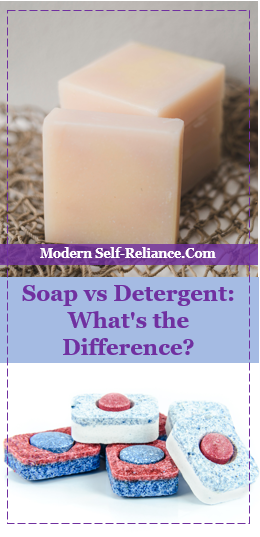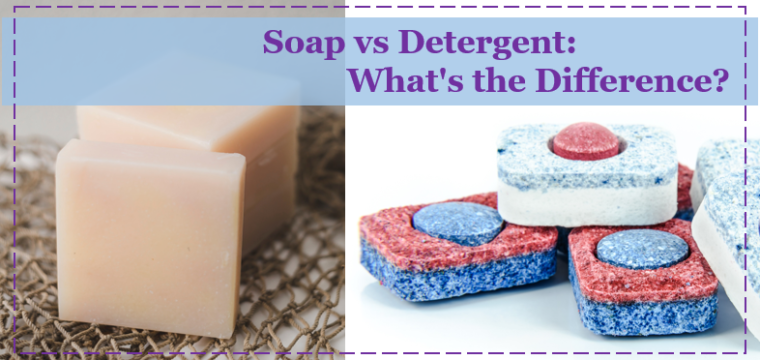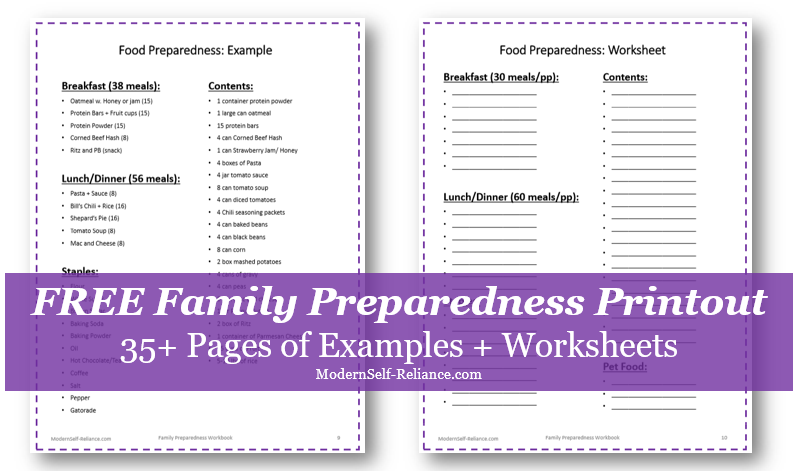Why do we say "dish soap" to refer to liquid hand soap but "dish detergent" for the stuff we put in the dishwasher? Aren't they the same thing?
Soap vs Detergent Purpose
Both soap and detergents are used to clean things (obviously). They both work similarly in that the molecule has a head that is attracted to water but hates oil. The molecule also has a tail that is attracted to oil, grime, and hates water.
The molecule is attracted to the dab of oil on your shirt, and many molecules flock to it, completely surrounding the oil spot. The head stick outward, because they want nothing to do with oil. This encapsulated bubble with oil at it's core, is attracted to the water and is carried away when rinsed. Thereby removing dirt and oil from what ever you want to clean.
How well the molecule is attracted to the oil/water vs being distracted by other things is basically the effectiveness of the cleaning product. If the molecule clings to the shirt, or bonds to minerals in the water, it doesn't work very well. If the molecule isn't very attracted to oil or water, it will just float along uselessly. If the molecule firmly attaches to the oil but isn't displaced by the water, now you have oil encapsulated but stuck on the surface you are attempting to clean.
Soap vs Detergent Definitions
"Soap is...a salt of a fatty acid" ~ Wikipedia
"Detergent is a surfactant...usually alkylbenzenesulfonates" ~ Wikipedia
Now that we have the formal definitions: what does it mean?
Soap is the reaction of a fat (olive oil, tallow, lard, coconut oil, etc) and an alkaline solution (lye, sodium hydroxide, etc). I use tallow, coconut oil, and lye in my Cold Process and Hot Processed Soaps. Soaps can also contain fragrances, dyes, exfoliants, and softeners/hardeners.
Detergent is a created salt or combination of salts that act as cleaning agents. The most common laundry detergent salt is Sodium dodecylbenzenesulfonate (wiki link). Commercial detergents could also contain water softeners, other surfactants, bleach, enzymes, brighteners, fragrances, and many other agents.
A Brief History of Detergent
Why Create Detergent: During World War I there was something of a fat shortage that led to a soap shortage. They also discovered there are other surfactants that can be used for cleaning, besides fat based soaps. After World War II the factories that created aviation fuel were converted to detergent factories, creating the market for mass-produced consumer laundry detergent.
Aside from the societal situation; soap does not do as well with hard water. The soap molecules will bind to the ions and minerals in hard water, making it much less effective. This could lead to limescale buildup or simple soap scum. Detergents are more effective by weight than soap at cleaning clothes, but may have environmental costs associated with it's efficiency.
Think about the old fashion method for washing clothes. The soap and water was applied then rubbed, or scrubbed to get the clothes clean. Then the clothes needed to be rinsed and rinsed to remove the soap. Detergents require less scrubbing to remove oils and also less rinsing. This makes them better designed for washing machines especially gentle washing machines.
The desire for an enclosed washing machine drove the manufacture of specifically formulated detergents. And the commercial production of detergents drove the market for washing machines. A true love story, laundry detergent and modern washing machines were made for each other.
Soap vs Detergent Manufacturing
Soap:
Ingredients: There are two major components to soap, the fat and the lye solution. Fat is harvested from an animal or plant source. The lye is created by leaching potassium hydroxide from plant material. (wiki for Lye)
In practice you take a bucket of wood ash, and fill it with water. The water will over time become very basic (vs acidic). When you can dissolve a feather, or a fresh egg floats (one that sinks in water), you know you have lye water concentrated enough for soap. Alternatively, you can buy powdered lye off the internet: powdered Lye.
To make the soap: You react (add together) the fat and lye in a ratio specified by a soap calculator. The ingredients will undergo soaponification, and create the new molecule, soap. I explain Cold Process Soap making here: 10 Simple Steps to Making Cold Processed Soap (+2 Easy Recipes)
Detergent:
I am not a chemist. I can't tell you know to make detergent at home. There are multiple steps, and ingredients I am not sure where you would find to try this at home. Here is what the experts have to say:
To make detergent: "In the most common route, benzene is alkylated by long chain monoalkenes (e.g. dodecene) using hydrogen fluoride as a catalyst. The purified dodecylbenzenes (and related derivatives) are then sulfonated with sulfur trioxide to give the sulfonic acid. The sulfonic acid is subsequently neutralized with sodium hydroxide." Source: Manufacturing Sodium dodecylbenzenesulfonate
Soap vs Detergent and the Environment
Soap: Soap is largely biodegradable, which has an advantage over some detergents. Of course, some additive components like plastic beads for exfoliation may be toxic to sea life, and non-biodegradable.
Detergent: Early detergents were not biodegradable and also contained a large percentage of phosphates. The phosphates encapsulate the oils, and keep them better suspended in the water for removal rather than sticking back to the surface. However the phosphates cause dangerous algae blooms in water discharge sources. Newer recipes mitigate some of these hazardous environmental effects.
A Case Against Pinterest "Laundry Detergent"
If you have been around the penny-pinching, homemade sections of Pinterest you may have come across recipes for homemade "laundry detergent". They tent to vary slightly but the major components are often:
- Fels Naptha Soap (grated)
- Washing Soda
- Borax
From our distinctions you may see why I put "laundry detergent" in quotes. They aren't really making the detergent, because they are using a bar of soap. However word choice aside, lets look at why I don't recommend this recipe.
Washing soda and borax are both water softeners, meaning they bond with minerals and ions in the water. This makes it so the soap doesn't bond with the minerals, but instead bonds to the stains on your clothes. Fine enough.
Lets get to the Fels Naptha:
#1 It's not a natural soap, if that what your into. It's loaded with chemicals just like any other bar soap, laundry soap out there.
- Soap (sodium tallowate, sodium cocoate or sodium palmate kernelate, and sodium palmate)
- + water, talc, coconut acid, palm acid, tallow acid, PEG-6 methyl ether, glycerin, sorbitol, sodium chloride, pentasodium pentetate and/or tetrasodium etidronate, titatium dioxide, fragrance, Acid Orange (CI 20170), Acid yellow 73 (ci43350)
#2 It is soap. It may cling to your clothing. More rinse cycle may be necessary to remove the soap. It will leave soap residue inside your washing machine; in the hoses and lines. Your washing machine was not designed to handle soap, and it's an expensive machine to repair. This bar soap was designed for laundry, but largely designed for hand washing or washing with older, vigorous washing machines. (Not today's gentle cycle machines.)
(Some pinterest sources recommend using vinegar in your washing machine after soap in order to combat the limescale and soap scum build-up. Or adding an extra rinse cycle, to clean the lines of any remaining soap. It's all about trade-offs.)
Other grated bars of soap:
Fat: I will give Fels Naptha one thing, it's not superfatted. Meaning there is little fat left in the soap. This is why it's great for removal of poison ivy oils. When making soap for use on skin, often times creators will add extra olive oil or coconut oil or the like, to the mix.
This fat will remain, non-converted, and will moisturize the skin. This is good for your skin; this is not good for your clothing or dishes. You do not want extra fat wandering around your washing machine, potentially getting your clothes more greasy then they started.
If you chose other bars of soap, say the hotel samples, wash your hands. Do they leave your skin feeling tight and dry? Then they didn't leave much fat in the soap and could be consider for use on clothes. Please don't use the creamy, boutique soaps on your clothes.
Suds: Some bars of soap create lots of suds for a creamy lather. From anyone who has suds over a washing machine knows, you don't actually want suds in your machine. Most commercial laundry detergents have additives that reduce suds.
Conclusion: I want to share knowledge not judgement.
If you love using soap in your laundry, go for it. If you find it works for you, great. If you are looking for a homemade soap to clean clothes, know it may take more rinsing or extra scrubbing. If you are a stick-to-what-you-know person, and gonna use what grandma used, then this article likely won't change your mind.
If you are looking for a more Eco-friendly, biodegradable product: consider using soap. If you are looking for an efficient, space-compact, cleaning solution: buy detergent. If you are looking for self-sufficient cleaning method and have access to animal fats and wood ash: make soap. If you want to keep using your high-performance, efficient washer: use detergent.
If you are living in a post-zombie world and somehow still have internet to read this blog: use whatever you got.
Read more:


